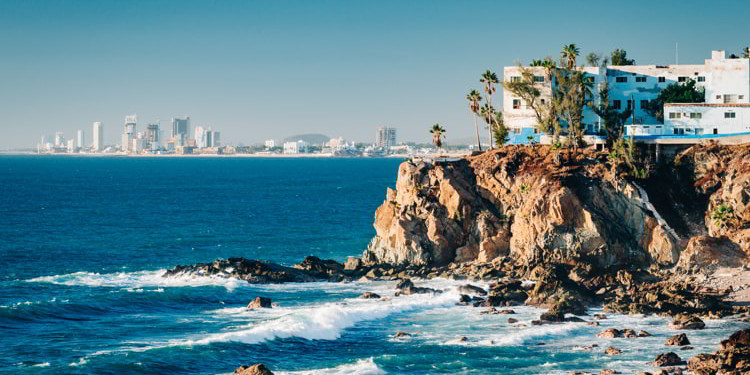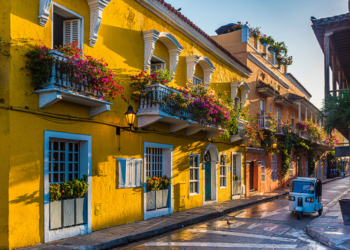The home my wife and I bought in Mazatlán, Mexico, a few years back was just what we were looking for—on the water, yet in the historic center.
But finding the property and making the purchase was a lot harder than it should have been…
I spent too much time spinning my wheels… mostly due to failure to follow my own advice. More on that in a minute.
I have two problems that continue to slow me down when looking at real estate abroad. Counterintuitively, it’s actually harder to pick a property when you have absolutely no restrictions on where and what you might buy and you have the whole world to choose from.
Think about it…
When moving to a new employment location during your work life, the country, state, and often the city are already determined. Your selection of neighborhood is based on convenience for living and commuting rather than any expectation of fun, adventure, or profit. But, when buying a second home or investment property abroad, the options are virtually infinite, which makes choosing much harder.
Also counterintuitively, the more experience I have, the harder it is to choose a property. This is because all that experience gives me more to analyze, which means I can find fault with almost anything. I’ll come up with a great property in the end, but it doesn’t happen quickly.
Here in Mazatlán, my real problem was that I failed to choose a lifestyle from those available. I struggled between being on the beach… or in the historic center… or in a community of large homes just off the beach. Had I settled on a lifestyle first, the property selection would have followed more quickly.
I thought I’d drop back and reconsider the basics. It’s a good opportunity to reflect on my own experience.
Here’s the thought process I use to get started on an overseas purchase…
Step One: Honestly Examine Your Underlying Reasons For Buying Abroad
The most important step in the entire process takes place before you even know what country you’re focused on: You’ve got to think about why you’re buying and how you intend to use the property.
Buying A Retirement Residence
At one end of the spectrum are buyers who are interested in a retirement venue or overseas residence—a place that will be more or less permanent, or at least long-term. People in this category have it easy because they only have themselves to please.
You can get a property that’s just what you need—no more and no less—without being concerned about what a potential renter might want. You can ignore the vacation rental market, look in non-tourist areas, and stay as far off the beaten path as you like.
I’ve bought a few overseas properties that were intended simply to be my residence, and they were the easiest to choose.
Start Your New Life Today, Overseas
Buying For Investment
At the opposite end of the spectrum is the investor. In this case, your personal preference for the size, location, and style of your property is secondary to the preferences of your potential renter or resale buyer.
In fact, an investor will often buy a property that they never use themselves. I bought a beautiful rental property in 2012 and never even entered the building after my initial viewing of the unit with the realtor.
Like a purely residential property, a pure investment property is also fairly easy to find because your objectives are simple and focused. You don’t even have to worry about living in the country you’re buying in.
Buying With A Mixed Agenda
In the middle—between the pure residential buyer and the pure investor—you’ve got everyone else who has some kind of mixed agenda such as a part-time resident who wants to rent out the property when he or she is not there.
Properties serving a mixed agenda are the most difficult to find thanks to competing sets of criteria. With this kind of mixed agenda, it’s imperative that one aspect of it—either the investment side or the personal-use side—have undisputed priority.
And this means you’ll usually have to make some compromises. For example, you may have to buy in a location that’s busier or more touristy than you like in order to be in an active rental area.
To use Medellín, Colombia, as an example, if I bought simply to enjoy a nice place to live, I’d probably buy in a quiet area of Laureles or Sabaneta. But to earn good rental income in a highly liquid market, I’d opt for the busier, upscale, and more-bustling El Poblado.
This self-analysis of your motives is important because it will determine where you look and what you look for.
And while it may sound easy, it’s not. It can be hard to be honest with yourself about your motives. If the property’s just for fun, that’s great; just remember this when you’re buying and don’t complicate the picture with investment data.
Step Two: Review These Basic Criteria When Considering The Country
No matter what kind of a buyer you are, you’ll need to pick a country that meets some basic criteria. Here are a few to consider:
- It should be a stable country where the rights of foreign buyers are secure and the purchase process is well-regulated and safe.
- The process for moving money in and out of the country must be reliable, with rights to expatriation of funds.
- You’ll need the ability to come and go freely and conveniently to the extent required to manage your property.
- The country should have an agreeable climate at least during the desired part of the year, either for you or for your renters and/or resale buyers.
- If you want to diversify outside the U.S. dollar, you’ll want a country that trades real estate in its local currency.
Additionally, if this is a retirement home, you’ll need to pick a country where you can obtain residency and have access to the banking system.
If you’re planning on part-year living, make sure you can stay as long as you’re planning to each year. I’ve obtained residency in four countries. Not because I needed all that for asset protection… but because I can go to each when I like, and stay as long as a like, with no restrictions.
Lee Harrison
Senior Correspondent

















